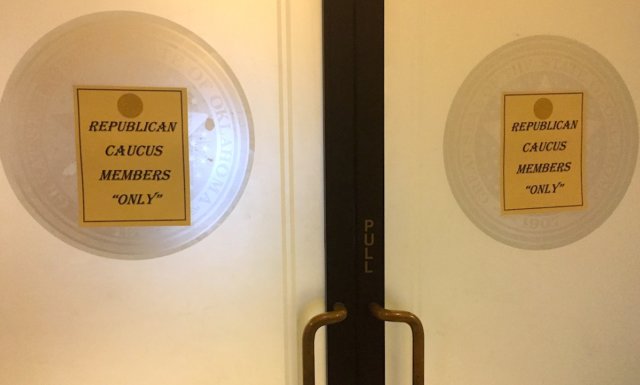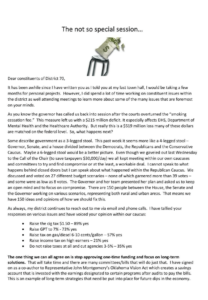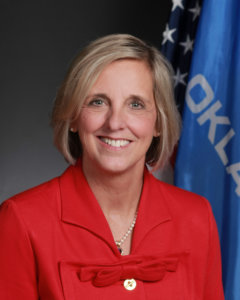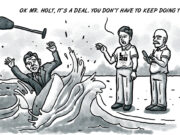

(Clarification: This post was updated at 8:20 p.m. Thursday, Oct. 12, to which proposal received the most support in whip count discussed.)
An email newsletter titled “the not so special session” from Rep. Carol Bush (R-Tulsa) to her constituents has frustrated members of her own caucus for two reasons: It discussed caucus whip counts, and it understated GOP support for new revenue ideas.
“I cannot speak to what happens behind closed doors but I can speak about what happened within the Republican Caucus,” Bush wrote. “We discussed and voted on 27 different budget scenarios — none of which garnered more than 39 votes — and some were as low as 8 votes.”
An undated version of Bush’s email was passed to NonDoc this week by way of a Democratic state representative, but reached today by phone Bush said it was sent at the end of September just after lawmakers returned for the ongoing special session.
Bush also said she later realized she had read her notes incorrectly and that a few revenue ideas did receive more than 40 votes in a September caucus meeting.
That aligns with what multiple other caucus members have told NonDoc on the condition of anonymity, and it matches what lobbyists and other Capitol insiders have noted for the past week: About a half dozen revenue proposals did receive support from more than 40 GOP representatives during paper balloting conducted at the caucus meeting Bush referenced.

The Oklahoma Constitution requires that any true tax increase — not the repeal of a tax exemption — needs 76 votes to pass the House of Representatives, unless it is sent to a vote of the people.
With one House seat currently vacant, GOP leadership needs at least four members of the now-28-member House Democratic Caucus to reach 76 votes, and a chunk of the Republican Caucus has routinely opposed new revenue proposals, meaning House leaders functionally need broad Democratic support to pass large revenue plans.
“The whole point (of the email) was — and this shouldn’t be any secret — that we have members of our caucus who are never going to vote for revenue-raising measures,” Bush said Thursday.
House Minority Leader Scott Inman (D-Del City) has said that, to gain his caucus’ full support, any grand bargain must include raising the 36-month incentive rate for gross production taxes on oil and gas wells from 2 percent to 5 percent.
‘I found that wonderfully encouraging’
After learning of Bush’s email, a House Republican Caucus member who asked to remain anonymous provided NonDoc with notes from the late-September caucus meeting, which showed seven ideas receiving support from between 41 and 47 members.
While there are 72 GOP House members, the vote totals provided indicate between 63 and 66 members casting anonymous ballots on the revenue ideas. The caucus lasted for several hours, and members left to use restrooms and take phone calls.
Ranging from 41 to 47, the seven revenue proposals said to have received the most votes were:
- GPT incentive rate from 2 to 3 percent
- GPT incentive rate from 2 to 3 percent and months dropping from 36 to 18
- Legacy GPT wells from 4 percent to 7 percent
- GPT incentive rate from 2 to 4 percent
- Elimination of wind sales tax exemption
- $1.50 cigarette tax
- GPT incentive rate remains at 2 percent but months drop from 36 to 18
Multiple caucus members also said that a proposal cutting agencies by 3.4 percent “and then going home” received more than 50 votes in opposition.
“Nobody liked that scenario, and I found that wonderfully encouraging,” one lawmaker said.
Another lawmaker said a proposal to take the GPT incentive rate from 2 percent to 5 percent received less support, with the caucus roughly split in half.
‘We are not in favor of just cutting’
Asked about Bush’s email and the caucus votes, the press secretary for House Speaker Charles McCall (R-Atoka) offered a brief statement.
“Caucus votes and discussions are confidential, and we are not going to discuss them publicly,” said Jason Sutton.
Bush offered a mea culpa for her email.

“I should not have posted the number, but I was frustrated as well. And it was a wrong number, but I’d already sent the email,” she said. “I should have just put a general statement that we have a hard time in our caucus coming up with the right plan to do this.”
While other members noted that the whipped votes listed above represent baseline support without leadership pressure, Bush praised McCall for putting forth several options and letting lawmakers demonstrate to themselves that they are “all over the board.”
“To the speaker’s credit, he literally was trying to show us how difficult this is to figure out a package and fix this mess,” Bush said. “It’s frustrating. We could see his frustration. We’re all frustrated.”
Earlier Thursday, Bush had texted: “My constituents appreciate the conundrum that we have with raising revenue. The majority don’t want cuts.”
To that end, Bush’s email newsletter contained a snapshot of her Tulsa district’s perceptions about what lawmakers should do to fix Oklahoma’s budget problems:
As always, my district continues to reach out to me via email and phone calls. I have tallied your responses on various issues and have voiced your opinion within our caucus:
- Raise the cig tax $1.50 — 89 percent yes
- Raise GPT to 7 percent — 73 percent yes
- Raise tax on gas/diesel 6-10 cents/gallon — 57 percent yes
- Raise income tax on high earners — 21 percent yes
- Do not raise taxes at all and cut agencies 3-5 percent — 35 percent yes
But one of Bush’s Republican colleagues expressed frustration with her mentioning caucus vote totals at all.
“How can members really open up and tell what they’re thinking in caucus if they’re worried that everything they say is going to be emailed out?” the member said on condition of anonymity. “So we can’t really have an honest discussion in caucus then.”
That lawmaker said hearing about Bush’s email was disappointing.
“As Republicans, we get beat up a lot. ‘Oh, you’re not doing anything.’ No, as a caucus, we want to address this issue,” the Republican representative said. “We are not in favor of just cutting and going home. The majority is not in favor of cutting and going home.”
Bush said she wanted to make it clear she does not leak caucus information.
“There is some sort of leak. I am not the leak, and I don’t want my colleagues to think I am,” Bush said. “I get calls or text messages even before I leave the Capitol about what has happened in caucus. And it’s usually from folks either in the media or lobbyists or Democrats. And I’m like, ‘How the hell do you already know this?’ This whole thing is very frustrating.”




















